How to Get Remote Jobs: 3-Steps to Land Offers Fast

Summary:
-
More than half (56%) of companies worldwide offer remote work, with 16% operating fully remotely.
-
Make sure to customise your resume and cover letter for each job you apply for, highlighting your remote work skills.
-
Use trusted job sites like FlexJobs, Remote.co, and PowerToFly to find good job listings.
-
Build a strong online presence on sites like LinkedIn to increase your visibility to recruiters.
Remote job opportunities have grown dramatically, now representing more than 15% of total job openings in the U.S., compared to just 4% before the pandemic.
So, getting a job in this competitive market is becoming increasingly difficult.
That’s why, in this post, we'll explore the strategies best for finding remote jobs. Find out the tips and tricks to boost your chances of landing a remote position that's best for you!
In this article:
- Explore remote job types
- Identify credible job sources
- How to create the perfect remote job application
- Essential skills for remote success
Types of Remote Jobs You Can Apply For
First, decide if you want a full-time remote career or flexible freelance jobs with some remote work. Many companies, especially in tech, now offer fully remote positions.
For example, if you are good at something, try teaching it online. Go for online math tutoring services!
Or, you might prefer the freedom of freelancing. Determine your preference, as this will shape your job search.
You'll often find it easier to get freelance work initially. But remote positions are also increasing as more companies embrace remote working.
"The growth in hybrid job postings increased from 9% in Q1 2023 to nearly a quarter (23%) of new jobs by the end of 2024. Fully remote jobs have also increased over the last two years from 10% in Q1 2023 to 15% in Q4 2024."
- Robert Half.
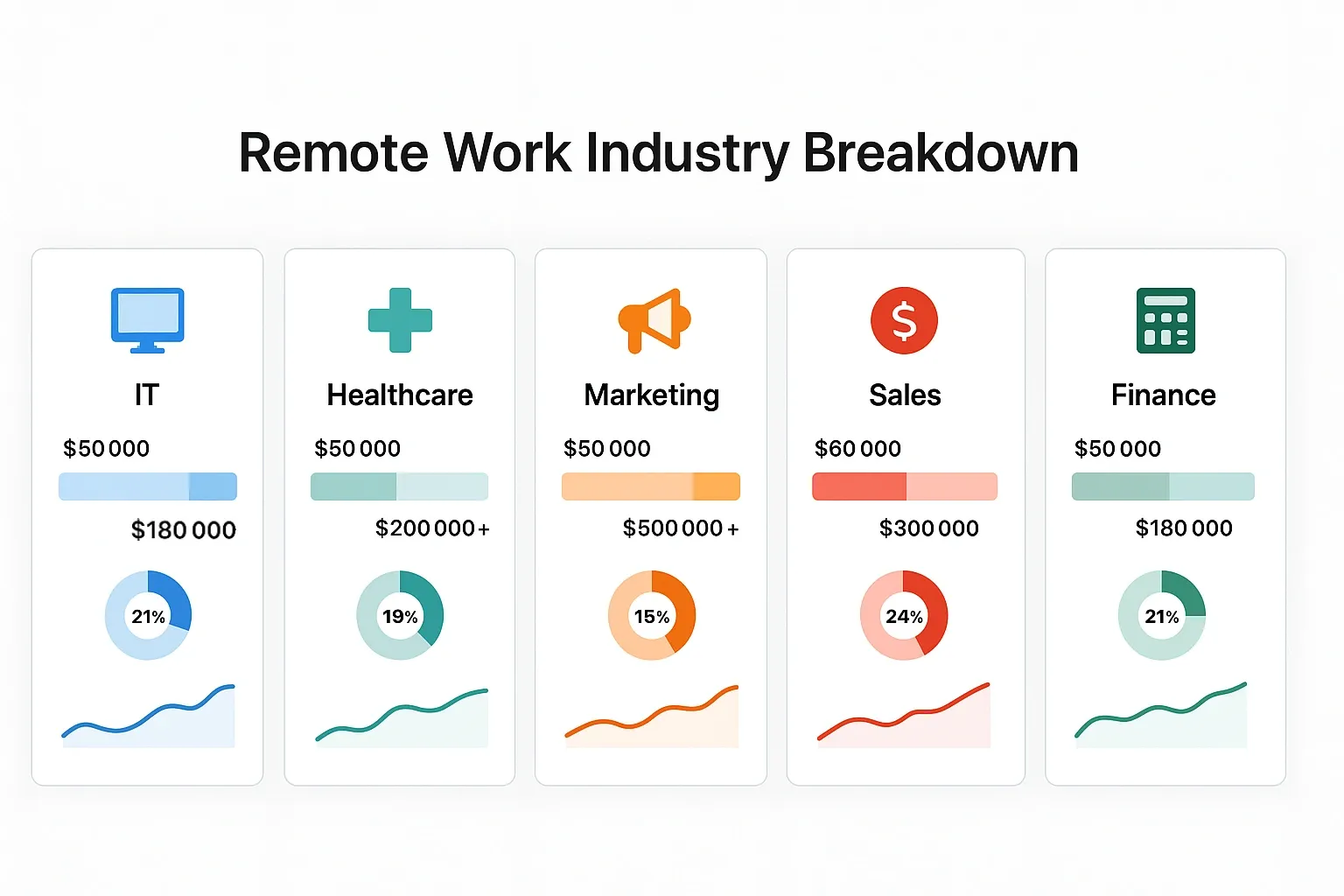
Popular job categories
- Tech: developer, designer, data analyst
- Marketing: SEO, content writing, social media
- Customer service & support
- Education: online tutor, ESL teacher
- Freelance/contract roles
Are Remote Workers More Productive?- Practical Feedback
Where to Find Legit Remote Jobs
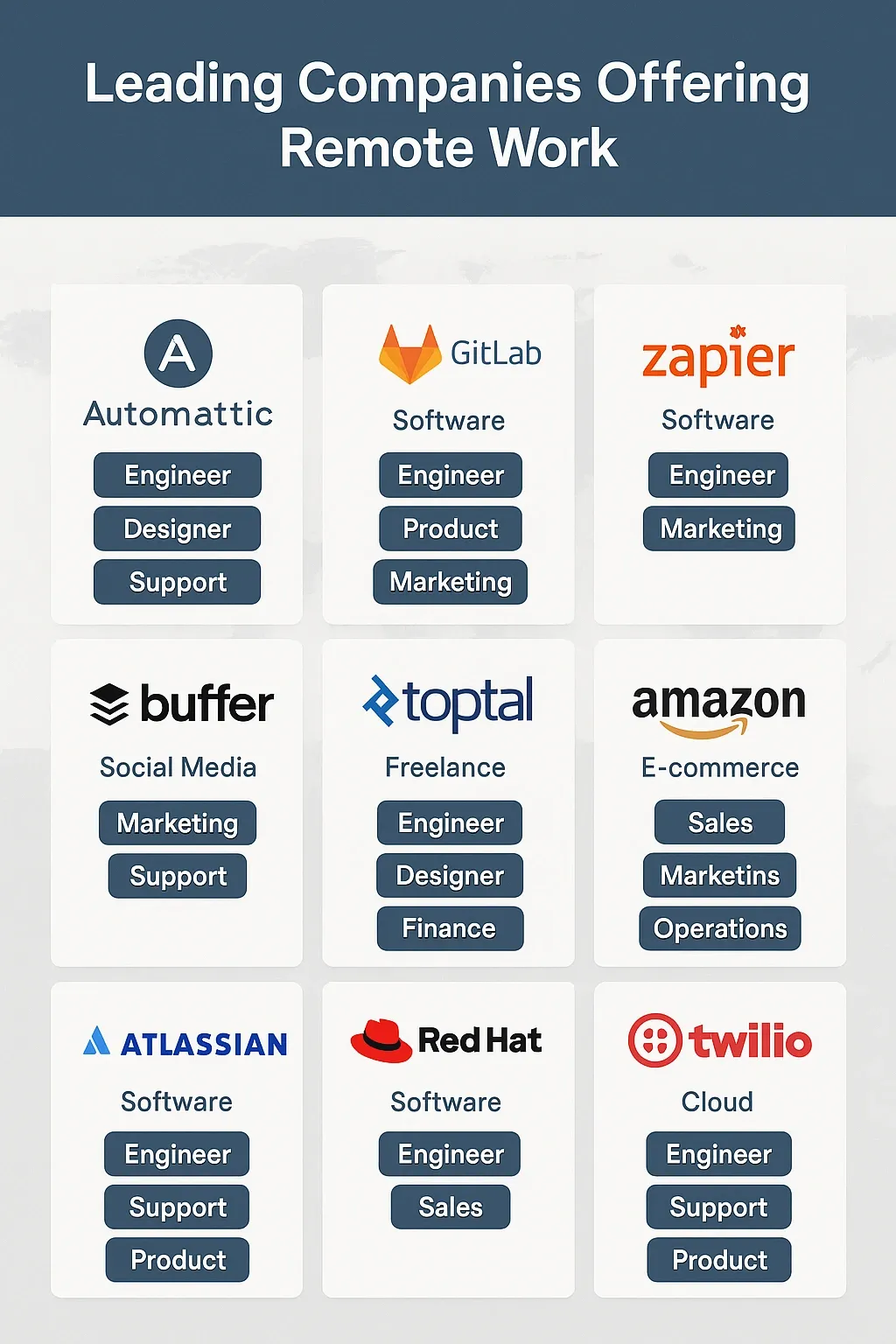
Starting with job boards is a smart move when looking for remote work. According to a recent report on job board performance, some boards attract more applicants and have higher hiring rates!
These are a few sites among a massive list of remote job-searching platforms -
FlexJobs
FlexJobs focuses on quality remote and flexible job listings. They have over 50 categories of jobs, from freelance to full-time, in many different career areas. A big plus is that they check each listing, so you can avoid scams and find real remote work.
FlexJobs has over 10,000 reviews on SiteJabber with high ratings.
"We have seen some great results from FlexJobs. We have the highest hiring percentage from FlexJobs compared to our 20 other postings. In the past month, FlexJobs has brought us four great nurses." - Source.
We Work Remotely
We Work Remotely has a simple and easy-to-use layout. It's packed with work-from-home jobs in areas like web design, customer service, and programming.
This is a popular site with a large number of users, so it's a good place to find a variety of remote jobs!
Remote.co
Remote.co offers a carefully selected list of remote job openings. You'll find jobs in fields like design, customer service, HR, sales, and development, as well as remote roles for writers and marketers. They focus on listing high-quality, relevant positions.
"Remote.co is incredibly helpful; using it gave me much hope after many failures/scams from other sites. I recommend this to anyone who is struggling to find a correct site for jobs."
- Evelyn
Remote.co has a 4.1/5 rating on Trustpilot based on 64 reviews.
PowerToFly
PowerToFly is designed specifically for women seeking remote work. They have a process to make sure candidates are a good fit, and then match them with employers for paid trial periods.
It's a structured way to find remote opportunities.
The platform has over 1,000 companies that have posted job listings, including major companies like Hearst, BuzzFeed, and The Washington Post. [Source: Trustpilot]
JustRemote.Co
JustRemote.co is mainly for people in tech and creative fields. If you're a web developer, marketer, or designer looking for remote work, this is a good place to check out.
"Our mission is to help you find work that you love and enable you to do it daily from anywhere."
- Tom Pinchen, Founder
The platform has been used by notable companies such as Starbucks, Squarespace, and Reddit to fill remote vacancies. [Source: Betterteam]
Remote Tech Jobs
If you're looking for a remote job in the tech industry, this is the job board for you!
It has a wide range of tech positions, organized into categories to help you find what you're looking for. Plus, they keep their listings fresh by removing old ones.
RemoteScout24
RemoteScout24 connects remote workers and employers in Germany, Austria, and Switzerland. It covers a variety of career fields, including marketing, software engineering, design, and management.
So, you’ll have a good selection of German-speaking remote opportunities.
RemoteScout24 is the most popular job board for home office, remote, and Hybrid jobs in Germany, Austria, and Switzerland.
These are the few sites among a massive list of remote job-searching platforms.
How to Avoid Remote Job Scams
"Fraudsters often prey on eager jobhunters by sharing very compelling roles. They then request personal information and use this to steal identities and empty bank accounts."
- Tim Hall, Chief Technology Officer at Boxxe.
Let’s talk about protecting yourself from remote job scams. These scams are on the rise, and it's important to be informed.
Red Flags
According to the FTC, reported job scam losses tripled from 2020 to 2023. It reached over $220 million, in the first half of 2024.
So, you need to be alert for some common red flags.
For example, if a job asks for upfront fees for "training" or "equipment”, it is one of the common job scams!
Also, watch out for vague job descriptions that don't really explain what you'd be doing. If you can't find any real company information, like a website or a physical address, be very suspicious.
Verify Companies (Glassdoor, LinkedIn)
Want to avoid fake job postings? To make sure a company is legit, do some digging.
Websites like Glassdoor and LinkedIn are super helpful. You can often find company reviews and employee information there.
Look for the best industries for remote work opportunities.
How FlexJobs Vets Listings
FlexJobs has a good process. They actually vet each company and job posting before it goes live on their site.
According to FlexJobs, they check for things like the company's business license and Better Business Bureau rating.
They also look at online presence to help job seekers avoid scams!
How to Stand Out When Applying for Remote Work
“Attention to detail and strong communication skills tend to be pretty universal and are things that recruiters pay attention to in every interaction.”
-Carol Cochran, VP of People & Culture at FlexJobs
Impress potential employers by showing you're not just a good worker, but a highly effective and motivated remote employee. Follow some easy tips and tools for working remotely!
Create a Remote-Optimised Resume
Your resume needs to speak directly to remote employers.
Ditch generic terms.
Use phrases like, "Boosted team collaboration by 30% through the implementation of new remote tools, resulting in a 20% increase in project management efficiency”!
Instead of "works independently," say "self-managed". Show you can handle distributed teams with "remote collaboration".
Many candidates even use an online AI resume builder to streamline formatting and ensure their skills stand out clearly for remote roles.
Write a Tailored Cover Letter for Remote Roles
Don't just repeat your resume. Instead, connect your experience to the specific requirements of the job description in your cover letter.
Say exactly what remote job you're applying for and where you saw it.
For instance, don’t say "Managed remote projects”. Rather, say "Managed remote projects for international clients. This increased client satisfaction by 15%."
Showcase Remote-Relevant Skills
"Successfully working from home is a skill, just like programming, designing or writing. It takes time and commitment to develop that skill."
- Alex Turnbull, Founder and CEO of Groove
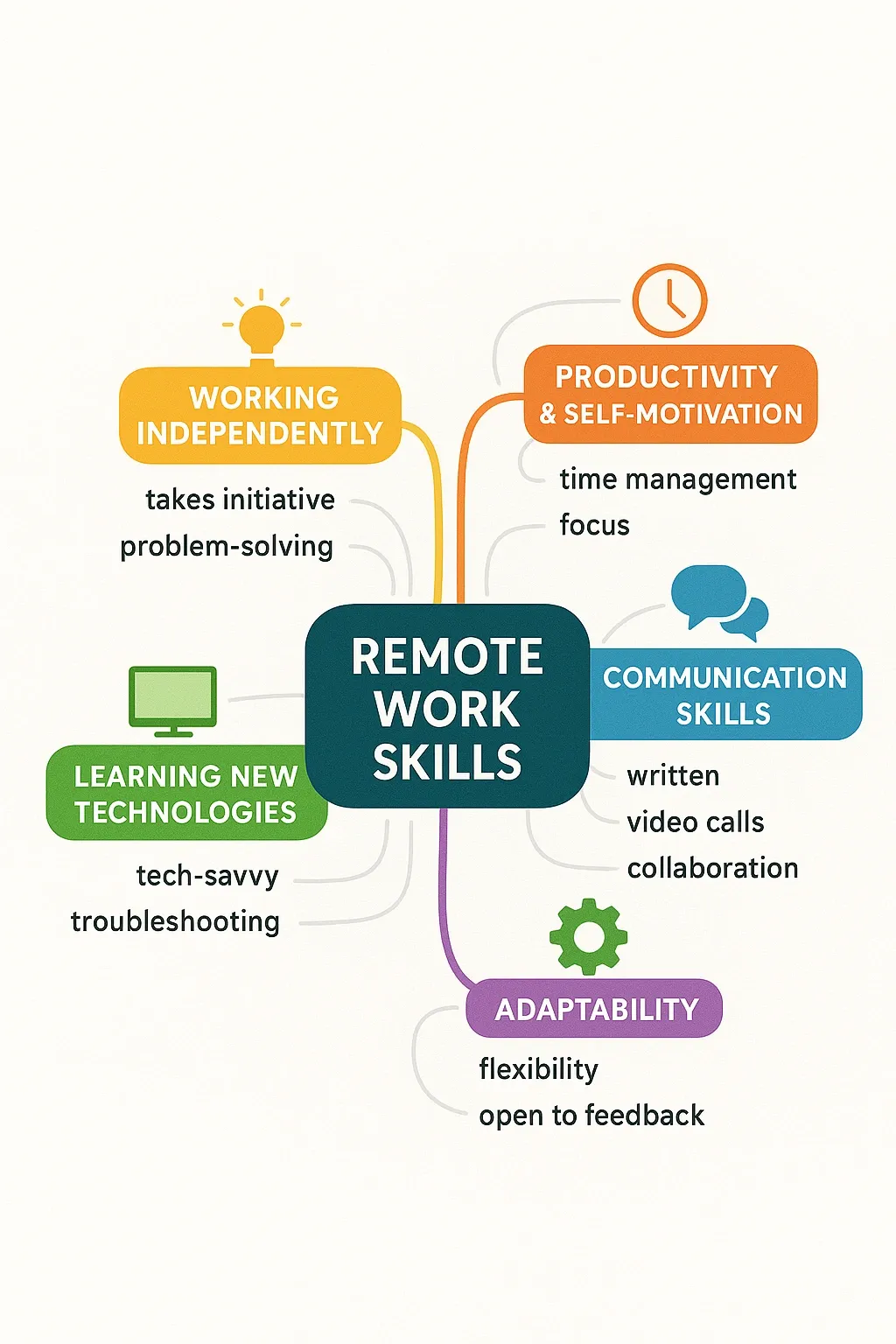
52% of remote employees prefer an asynchronous communication style, as it minimises disruptions and accommodates different time zones.
And SHRM highlights self-discipline as crucial for remote workers.
Great communication and self-management are key for remote work. For communication, show you can clearly share ideas and collaborate well with remote teams using tools like Slack and Zoom.
You could say, "Proficient in Slack and Zoom, streamlining communication and boosting collaboration, leading to 20% fewer project delays."
For self-management, you can say, "Consistently met deadlines remotely using time-blocking and Asana, with a 95% on-time delivery rate."
How To Be Productive In a Remote Work Environment
Tips to Increase Your Chances of Getting Hired as a Working Nomad
More than half (56%) of companies worldwide offer remote work, with 16% operating fully remotely. You just need to find the right remote job postings or hybrid roles!
In case you're thinking remote jobs are shrinking, you'd better listen to what Mark Lobosco, VP of Talent Solutions at LinkedIn, has to say.
"Now that companies have built the framework – and experienced the cost and time savings associated with remote work – there's no real reason to turn back."
So it's time to dive full and increase your chances in the remote job market.
Build a Strong Online Presence
A recent survey found that 90% of employers look at social media when hiring, and 79% have rejected candidates because of what they saw online.
A professional LinkedIn profile is key. Active LinkedIn users gain more recruiter visibility. And profiles with a photo get 21x more views and 9x more connections!
So, share industry insights and connect with professionals. A personal website also helps.
Network in Remote Work Groups
Studies show that networking fills up to 85% of jobs!
Join remote communities on Indie Hackers, Reddit, and Slack groups. Engage in discussions and share your knowledge.
These platforms connect you with people in the remote work sector and can lead to new opportunities.
Who Should You Contact?
When seeking remote job support, start with people you already know and get along with. This could be someone you've chatted with casually, emailed regularly, or connected with meaningfully.
It's more effective to strengthen these existing relationships than to reach out to strangers.
Then, expand your network by connecting with people who share your interests and understand your goals and work ethic. This way, your connections will become stronger and more helpful when you're passionate about your work.
Where to Find People to Communicate with?
● Email contact list
● LinkedIn Connection
● Twitter and direct messages
● Slack channels
● Facebook groups or private messages
● Community sites: Inbound, HackerNews, GrowthHackers
Tips for Interacting With Your Connections
- Ask about their position, business, or projects
- Think of how you can help them with your passion and work
- Refer to an earlier conversation
- Be short in your message and pleasant to them
- Make it comfortable for them to refer you to another company
Search for Unadvertised Positions
Many companies use online systems to manage their hiring process. These systems help them collect and organize information from job applicants, making it easier for hiring managers.
Some popular platforms include:
- Zoho Recruit
- BambooHR
- Jobvite. com
- Recuiterbox. com
- Workable
The challenge is that you can't usually search for jobs directly on these platforms. However, there's a handy trick to find positions posted on them. Use this search on Google:
Go to Google. com and type: site:bamboohr.com + (position name, remote, or industry)
For example, site:bamboohr.com copywriter
Finding Remote Jobs with Twitter’s Advanced Search:
You can also use Twitter's advanced search to find jobs listed on these platforms. Include keywords like "marketing," "location," or "remote" to narrow your search.
Cold Emailing or Job Outreach
These days, cold emailing is a popular marketing technique. And you can use it to find remote jobs, too! It's similar to cold calling, but instead of calling, you're sending out your resume.
This is also known as "job outreach."
This method lets you find jobs faster than just waiting for them to appear.
And this is how you do this:
- Figure out which companies might need someone with your skills.
- Find lists of companies in your industry.
- Write a personalized email. Don't make it too salesy, and don't make it all about you.
- Keep track of your emails in a spreadsheet.
- Include links to your online profile and your work samples.
Get Testimonials or Work Samples
For freelancers, testimonials and work samples are vital.
Positive feedback builds trust and demonstrates your capabilities. And a portfolio of your best work shows potential employers the quality of your output and your experience in remote roles.
Leverage Upwork & Fiverr
Use platforms like Upwork and Fiverr early on. They provide experience, help build a portfolio, and enable you to acquire testimonials.
Start with smaller projects. It can establish a strong foundation for your remote career.
Try out the work-from-home apps for better help, too!
Keep Your Eyes Open for New Openings
Stay on top of new job opportunities. This means setting up alerts on your email, phone, or other apps.
You want to be one of the first to apply, before they get overwhelmed with applications and start just discarding them.
Here are some useful apps you can use to set up these alerts:
- Google Alerts
- Buzzsumo
- TalkWalker. com
- Mention
Common Mistakes to Avoid when Looking for a Remote Job
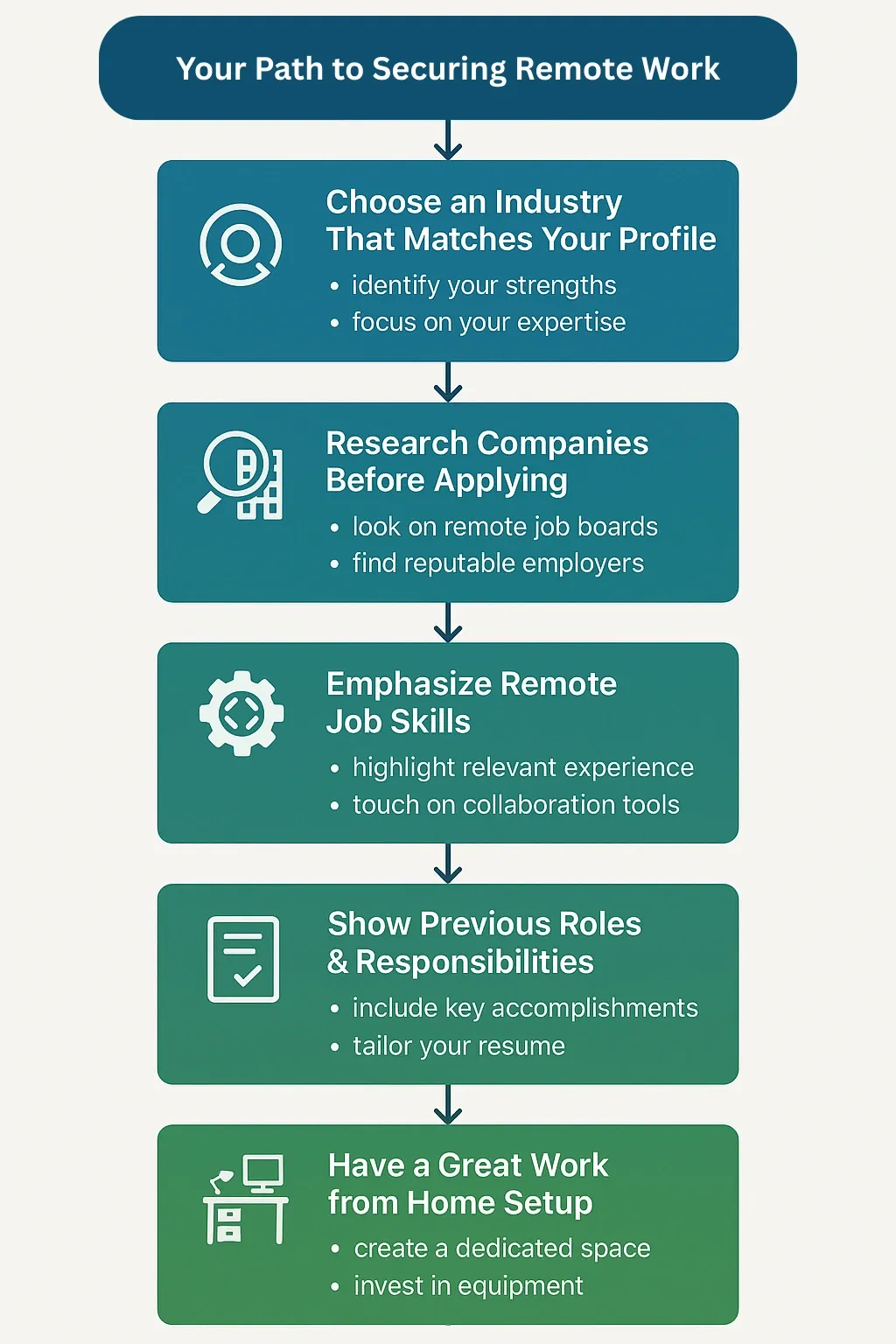
"We tend to steer away from candidates who mention they work best in a team environment or need constant feedback."
- Joan Stearns, HR Coordinator
And when looking for remote work, avoid:
- Applying too broadly or blindly
- Not tailoring your resume/cover letter
- Ignoring timezone and async culture fit
- Expecting instant results
How 3 People Landed Remote Jobs in Different Ways
Getting a Remote Customer Support Job With No Experience
One person on Reddit told a story about moving from the hospitality industry to a remote customer service job.
They didn't have any customer support experience before. But they used people skills to get hired. Some other people in their training group also had little or no experience.
This shows the company likes transferable skills. Also, they gave comprehensive training to new workers.
Building a Personal Brand (GitHub + Blog) to Get Job Offers
A developer, writing under the pseudonym "Coders Stop", shared how they made their GitHub profile stand out when looking for jobs. They carefully showcased their best work in repositories, created detailed READMEs, and displayed their projects well.
Because of this work, they got five job offers without even applying for jobs!
Doing Full-Time Remote Work on Upwork
Jacqueline DeStefano-Tangorra is a good example of someone who went from regular work to a full-time remote job through Upwork.
She first worked as a financial auditor at PwC.
Then, during Covid, she started doing freelance work on Upwork. She focused on tech and data projects.
She did so well that in 2021, she started her own company called Omni Business Intelligence Solutions (OBIS).
Since then, OBIS has gotten 131 contracts and made almost $470,000 on Upwork.
Jacqueline's story shows how using your skills and using freelance sites can lead to big career changes. [Source: Business Insider]
The Questions You Need to Answer Before Beginning Your Search:
You might be excited to start looking for remote jobs. However, a successful search needs careful thought and planning!
Want to know exactly what you want and assess your ability to handle remote work? Then answer these questions for a clearer picture of what you're looking for-
How Much Do You Need? Are Other Benefits a Priority to You?
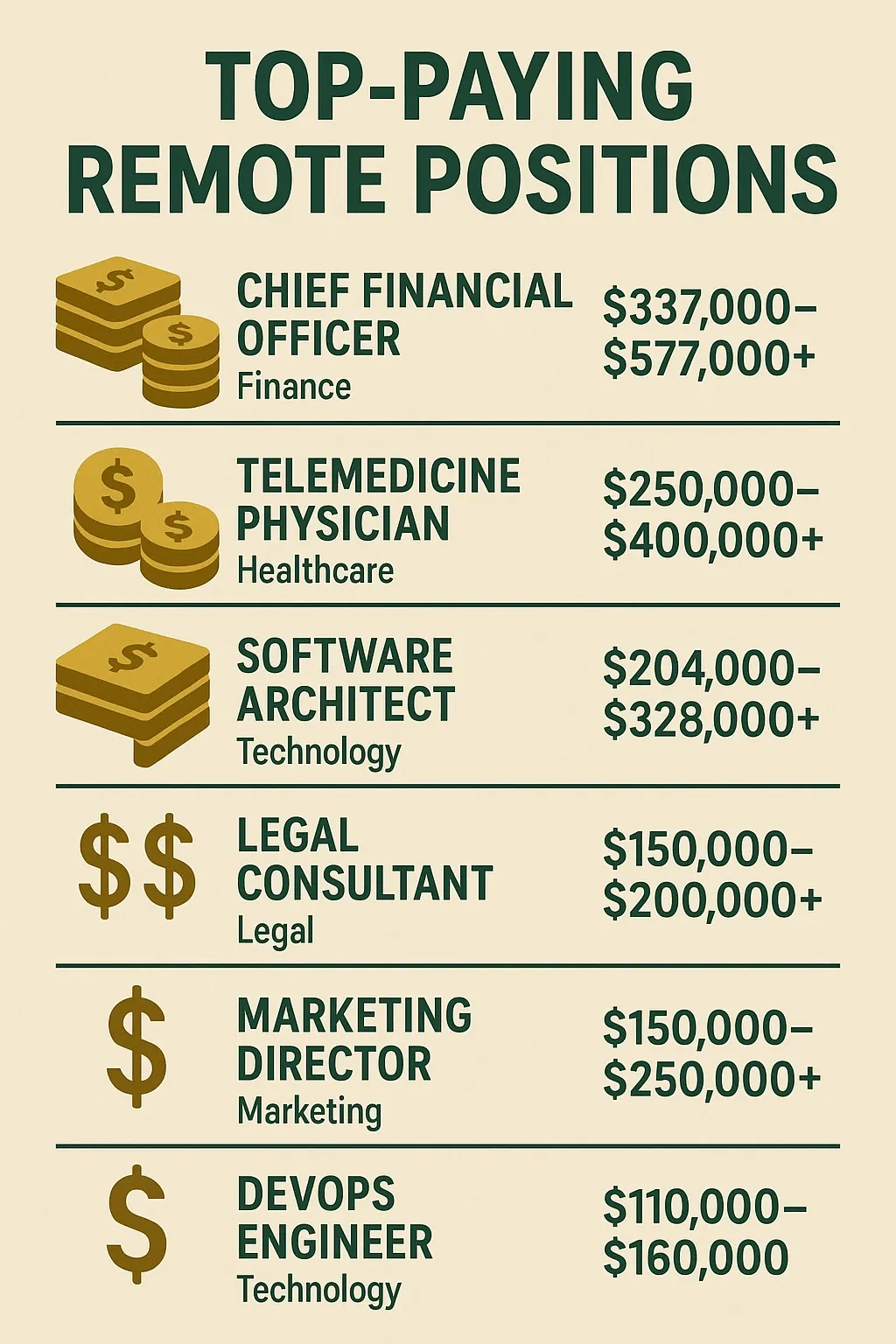
Salary talk usually happens later in the interview process. But it's still good to know what you're worth and what kind of pay you're aiming for!
You can check out sites like Glassdoor and Salary.com to get an idea of what people with your experience get paid for similar remote jobs. Remote jobs can be a great source of quick money!
And don't forget about the extras! Companies offer all sorts of benefits beyond just the paycheck. You'll see things like health insurance, retirement plans (like 401(k)s), paid time off, money for learning new skills, and even wellness programs.
Some remote companies provide money for your home office, co-working spaces, or team get-togethers to keep everyone connected.
Think about what's really important to you, and keep that in mind as you look at different companies.
What Position Do You Want?
Next up, let's get super clear on the kind of job you're actually looking for. Instead of just saying "marketing," for example, do you want to be a Content Manager? Or are you more into Email Marketing or SEO? If you're in development, are you focused on Front-End, Back-End, or Full-Stack?
Once you know your focus, make a list of keywords to use when you're searching for jobs. This will help you big time when you're looking at job boards and company websites.
Here are some examples of job titles and keywords to get you started:
- Content Manager
- VP Marketing
- Copywriter
- SEO Specialist
The more specific you are with your keywords, the easier it will be to find exactly what you're looking for.
Plus, using the right keywords helps those application tracking systems (ATS) and recruiters find you.
Do You Need Any Training to Develop Your Skills?
Once you know the kind of job you want, think about whether you need to brush up on any skills. If you find any gaps, don't worry—there are tons of online resources to help.
Want to learn coding? Go for FreeCodeCamp or Codecademy. Websites like Coursera, Udemy, and Skillshare have tons of courses!
Sites like edX (from Harvard and MIT) offer university-level courses. Take advantage of these learning opportunities! This will show employers you're serious about your career and make you a more attractive candidate.
Is Your Resume Perfect for the Position You’re Considering to Apply?
You need to tweak your current resume for every single job you apply for. A generic resume just doesn't cut it, especially for remote positions.
Always customize your resume based on the role you’re applying for. This shows the employer you've done your homework and understand what they need.
So, your custom resume should only include the skills and experience that are relevant to that specific job.
For example, if you're going for a remote marketing manager role, really highlight your marketing experience and wins. Sure, other experiences might be good, but it shouldn't be the main focus.
You need to personalize your cover letter, too! Write your cover letters uniquely. Tell a story about why you're a great fit for that remote role and that company.
Use a website portfolio to show off your best projects and give them concrete examples of your work!
One more thing: you have to keep in mind sometimes some job platforms can be geo restricted. In that case you can use vpn or residential proxy to access those sites.
Now that you have seen what you want and are organized, we can dive into the hacks you need to know to land a perfect remote job.
So, Are You Ready to Begin Your Remote Job Hunt?
Technology has made it much easier for companies to switch to remote work. Even so, finding the perfect remote job can still be tough. More and more people are looking for these popular remote careers.
To really get noticed, you need to make your applications personal. Clearly show the special skills and value you bring.
Follow the strategies we’ve discussed, and you'll become more organized and focused. This will greatly increase your chances of getting interviews and landing your ideal remote job.
Frequently Asked Questions About Finding Remote Jobs
What is the best way to find a remote job?
The best way to find a work-from-home job is to check out special job websites for remote work. Connect with people in your field and even look for jobs that aren't publicly advertised on company websites by searching smartly!
Will Amazon really pay you to work from home?
Yes, companies like Amazon really do hire people to work from home, especially in customer service and some office jobs. You can find these work-from-home job openings on their website, where they list jobs.
Is it hard to get hired for a remote job?
It can be a bit tough to get hired for a work-from-home job because lots of people want to do it. So, make your resume look good, make your job applications specific to each job, and show off the skills you have for working remotely. You'll have a better chance of getting hired!
How do I find my first remote job?
If you want to find your first work-from-home job, look for entry-level jobs on websites that list remote work. Think about the types of jobs where people often work remotely. Don't worry if you haven't worked remotely before – just highlight the skills you already have!
How do I find legit remote entry-level jobs in the U.S/California?
For real entry-level work-from-home jobs in the U.S., including California, use those special remote job websites. Filter by location and how much experience they need. Be careful of fake job ads and always check out the companies on websites like Glassdoor and LinkedIn!
How do I search for a remote job to work from home?
To search for a work-from-home job, use simple words like "remote" or "work from home”. Don't forget to include the type of job you want on regular search websites! Try special job websites for specific kinds of jobs. Use the advanced search tools to help you find exactly what you're looking for!
What are the best sites to find remote jobs in 2026?
Some of the best websites to find work-from-home jobs in 2026 are FlexJobs, We Work Remotely, JustRemote, Remote.co, and Pangian. These websites often have lists of good remote jobs to help people like you find great work-from-home opportunities.
